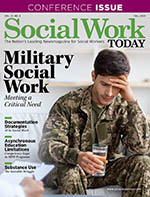|
Fall 2025 Issue Editor’s Note: Lighting the Way I find it hauntingly beautiful, the gradual change in seasons. That liminality between summer and fall, a gap in time where things feel as they did at the summer’s peak: warm days, the delayed fall of night. But now the days are getting cooler, and the night sets in swiftly. Those of us more sensitive to these changes retreat inward, bracing for the coming cold. In the same way, those in the social work field are bracing for the various changes affecting their practice, minimizing harm where they can, and addressing gaps, especially for vulnerable populations. This issue has stories addressing the unmet needs of rural communities, the relationship difficulties of unmarried Black mothers, and adults diagnosed with autism. One community in which such a gap exists is that of veterans. This issue’s cover feature, “Military Social Work: Meeting a Critical Need,” focuses on the mental health needs of veterans returning from combat. Reacclimating to everyday society is vital, and colleges and universities are increasing the number of programs specializing in military social work to make reacclimatization that much easier. As has become a trend, the topic of AI is raising numerous questions. This time, specifically regarding ethics and risk management. Frederic Reamer discusses in his feature, “Documentation Strategies: AI in Social Work,” not only the use of AI in social work, which has become an inevitability, but also protecting patient data gathered by AI to protect patient confidentiality. With the burgeoning offerings by colleges for asynchronous learning programs, making it easier for those with little time during the day to obtain a social work education, the question must be raised: Are there aspects of learning being unintentionally excluded from such programs? Gariy Livshits addresses this in his feature “Asynchronous Education Limitations.” It is almost always difficult to broach the topic of drug use during pregnancy; however, the issue remains prevalent. The usage of drugs during pregnancy can have profound impacts on the children of mothers who use—impacts that largely go undetected or undiagnosed due to a lack of outward symptoms postbirth. Elizabeth S. Goar addresses the important role social workers play in ending the stigma surrounding this issue, as well as the support they can provide to mothers and their children to positively influence their development and reduce the harmful effects. As always, enjoy the issue. — Josh Hildebrand |


